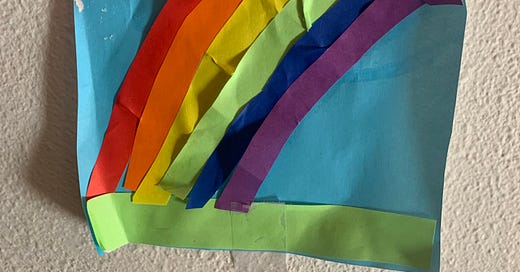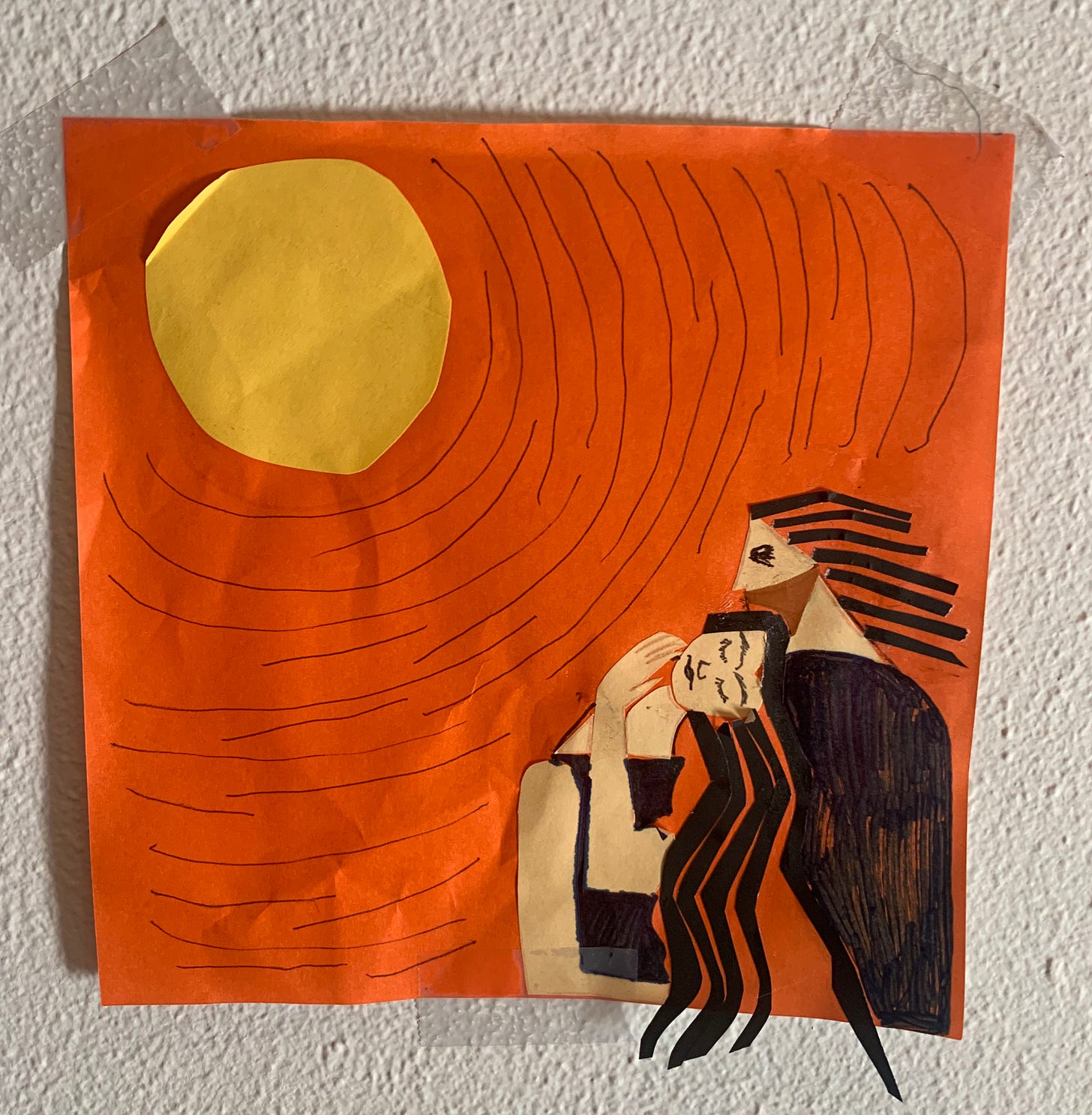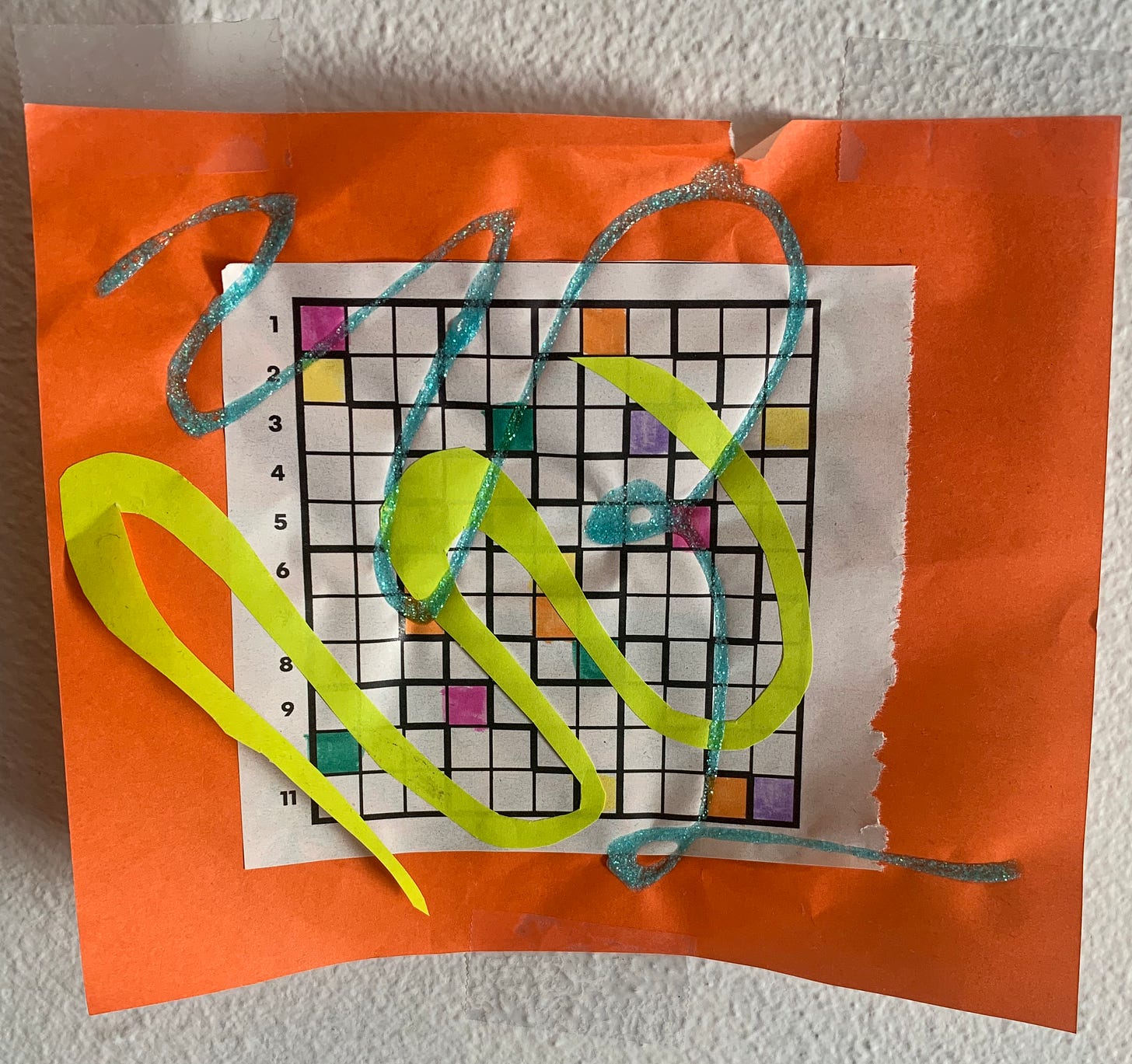I have been listening with rapt attention to last week’s episodes of Glennon Doyle’s podcast, We Can Do Hard Things. In it, she reveals to her wife and sister that she has had an eating disorder relapse and the three of them have a conversation about how she’s been feeling and where to go from here. What to some might feel like an overshare, for me is a really interesting example of “learning in public”—modeling that even idolized writers and feelers sometimes lose control and have to begin again. (Not to mention that it’s really helpful for me, a recovering enneagram 2 helper-type, to hear her people show up for her in a way that is loving, but boundaried.)
At one point, Glennon is thinking through the context in which the relapse happened, and she realizes that she is in a period of not writing. (Her bestselling book, Untamed, is being turned into a TV show, so she’s having meeting about that, but not working on anything new yet.) She wonders if not having that outlet for some of her darker feelings has led to the relapse, and says she’d like to explore other creative outlets—maybe build a mosaic or something.
Which brings me to my point here: I have found—even in the midst of a pandemic, war, environmental collapse, racial reckoning, especially in the midst of a pandemic, war, environmental collapse, racial reckoning—that weird, small projects keep me alive.
What do I mean by weird, small projects? I don’t mean my book projects, which are a deep honor to work on, but also anxiety-producing and mammoth and rich with ego delusions. I don’t mean my entrepreneurial and consulting work, which is fun and interesting and “of service” in a way that lights me up, but involves email and deadlines and deliverables. I don’t mean my organizing and activism, which is hard and can be joyful and helps me keep growing up and taking responsibility.
I mean, the stairwell of collages that my daughter and I created over the course of a few weeks during pandemic days.
I mean poetry that I write and don’t imagine anyone ever reading.
I mean the little piece of garden I am tending, complete with painted stones and glass bottles filled with witchy children’s brews.
I mean the slow, pleasurable accumulation of Goodwill sweaters and blouses and that constitutes my 1970s-librarian-who-loves-hip-hop-and-rides-horses signature style.
I mean making the perfect playlist for my new found love of cooking a vegetarian meal while drinking a Racer 5.
There’s a part of me that finds this list deeply shallow in a time of death and inequity, but I also know that humans get by via the smallest of adjustments—as if the difference between surviving another day is sometimes as small as the slight turn of the radio dial to hear a song with more clarity. Your soul settles into survivability. Your heart remembers that there is creativity and surprise alongside the depravity and sad predictability of violent men. Your hands are working on something and this is so comforting after your brain working so hard on so many terrible things.
Is this creativity as self-care? I don’t know. As Iraqi artist Sundus Abdul Hadi writes in Take Care Your Self: The Art and Culture of Care and Liberation, “At this point, I have self-care exhaustion. The term has become so overused and commodified that it’s lost much of its significance to me.”
But she also asks: “What is the opposite of violence?”
And her answer, as is mine, is not simply peace, but creativity and care. In caring for a little piece of earth, one rejects the idea that scale is all that matters, or that all worthwhile labor is paid labor. One creates unruly beauty for its own sake. In creating small, weird projects, one reclaims one’s energy away from destruction, plays like a wise child, sheds illusions of perfection. One finds an outlet for the unspoken and unbranded.
Everyone deserves the space for this kind of creativity. It’s as fundamental a human right as shelter, emerging in war zones and refugee camps and everywhere else where and when people have to remind themselves and each other about our capacity for kindness and delight.
I learned this from watching my mom. There was a brief period in my adolescence when she became obsessed with bedazzling pumpkins. She had a bulletin board filled with weird, little drawings and quotations and pictures she’d ripped from magazines. To this day, when you walk through the yard at her house you must look closely—you will find seed pods spray painted florescent blue, and small shrines to goddess-knows-what, and collections of shells and bones and shards of glass that may or may never make it into a piece of art. Abdul Hadi, too, says she learned this form of care and creativity from her mother: “My mother was always creating in our home—painting, sculpture, drawing, and sketching. Because of her, we were surrounded by art our whole lives.”
The people I am most drawn to right now are those whose days are spent in serious pursuits, but also in small bursts of tender creation. Our hearts should be broken, but we should not surrender them to a simple narrative of destruction. There are things being planted and painted all around. There are dreams being written down. There are stones being collected and sweaters being knit, and we will keep connecting with each other and our artistic instincts like this along the way. It’s the only way I know to survive being human.
So what is the weird, small project helping you survive right now?







This line made me laugh out loud: "I mean the slow, pleasurable accumulation of Goodwill sweaters and blouses and that constitutes my 1970s-librarian-who-loves-hip-hop-and-rides-horses signature style."
I first visited Bethlehem in the West Bank in 2005, not long after Israeli tanks and PLO resisters had faced off in and around the Church of the Nativity. At the other end of the street were young Palestinian students and their mentors delving into jewelry making, film production and drama as a way to enhance and underscore the power of creativity in a time of occupation.
In my own life - a good loaf of sourdough bread (even before the pandemic), a well chopped pile of wood for the woodstove, the patient collecting of coffee mugs from places I love, listening to quirky radio programs from Nova Scotia, the refinishing of an antique table, and an occasional reflective piece on social media are a few of the things that keep me alive and joyful amidst the pain, confusion, anger and war all around.
In the past month I've started to film myself doing house renovation/little building projects and putting them on YouTube. Mainly just my family watches them. It sounds (and is) pointless to stay up late after my daughter is asleep in order to spend hours and hours editing and putting together the videos, and the whole thing definitely feels weird to focus on while there is so much suffering going on. That said, it also has provided me with a way I can channel creativity and excess energy into building/making things and then being able to share and explain them to others, and it's been strangely profound in how much it has shifted my overall mental state and capacity to deal with the rest of the world. I think you described it perfectly when you wrote "your hands are working on something and this is so comforting after your brain working so hard on so many terrible things". Thank you so much for writing about this.